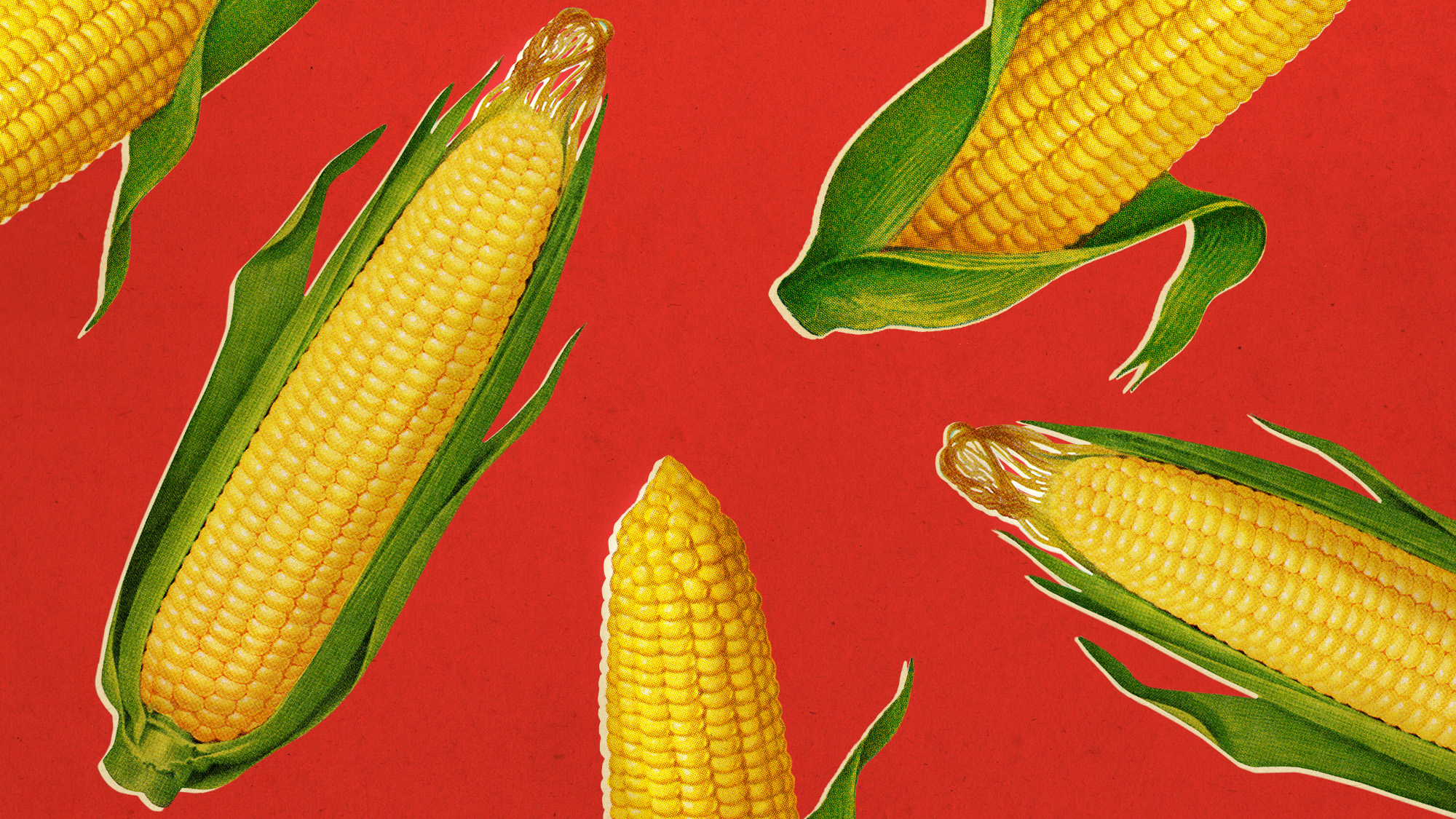How 'corn sweat' has made summer in the Midwest worse
Lend an ear to this kernel of agricultural science


A free daily email with the biggest news stories of the day – and the best features from TheWeek.com
You are now subscribed
Your newsletter sign-up was successful
Odds are good that at some point in the past few months, depending on where you live, you have stepped outside and immediately regretted leaving the comfort of air conditioning for the heat and humidity of summer. Odds are also good that at some point in the not-too-distant past, you have ingested corn in some form or another — on the cob, popped, as an oil — perhaps even while sweating on account of the aforementioned heat and humidity.
As it so happens, these two summertime likelihoods are inextricably connected, particularly in the Midwest. There, millions of acres of farmland is dedicated to the nation's sizable corn industry. For as much as people expect summertime to feature uncomfortably muggy days, the soaring temperatures and sticky dew-point levels across states like Iowa, Minnesota and Kansas are the direct result of a little known agricultural and environmental phenomenon known as "corn sweat." Yes, corn does indeed sweat, and when it does, millions of people feel its effect.
So what is corn sweat, and why has it made this past summer so uncomfortable?
The Week
Escape your echo chamber. Get the facts behind the news, plus analysis from multiple perspectives.

Sign up for The Week's Free Newsletters
From our morning news briefing to a weekly Good News Newsletter, get the best of The Week delivered directly to your inbox.
From our morning news briefing to a weekly Good News Newsletter, get the best of The Week delivered directly to your inbox.
Understanding 'evapotranspiration'
The first thing to know about corn sweat is that it is not just corn that sweats. Other crops, like soybeans, also undergo a process known as "evapotranspiration" in which the plants pull water up from the soil, and then "sweat" the H2O into the atmosphere. And it is not the ears of corn themselves that are sweating, said University of Minnesota field crops educator David Nicholai at Kare11, it is "water movement coming out of the soil, going up through the plant, out through the leaves with a little opening."
In large enough quantities — for instance, across the 90 million acres estimated by the U.S. Department of Agriculture to be dedicated to corn farming — that vaporized water humidifies the air and "can worsen stifling heat by driving up the humidity levels, making hot summer days all the more miserable," USA Today said. Iowa's corn crops, for example, push out a staggering "49 to 56 billion gallons of water into the atmosphere each day," according to the National Weather Service.
The corn sweat that contributed to the heatwave during the last week of August over much of the Midwest pushed dew points "as high as the 60s and 70s," even reaching "the low 80s" in some places, said Scientific American. "Things start getting sticky at around 60 degrees F (16 degrees C) — and downright miserable if this measurement reaches the 70s F." The "peak time" for corn sweat is growing season during mid-to-late summer, the Des Moines Register said. The phenomenon "contributes most to humidity during July and August."
'Climate change and the steady march of industrial agriculture'
Excessive heat and humidity like the kind experienced across much of the country recently "have never been unheard of or even rare," Scientific American said. What has changed, however, is that these events are "becoming hotter and happening more frequently than in the past" as a result of fossil fuel consumption. Corn sweat heat waves are a "hallmark of Midwestern summer," but they could be intensifying "thanks to climate change and the steady march of industrial agriculture," said The Associated Press.
A free daily email with the biggest news stories of the day – and the best features from TheWeek.com
Climate warming brings a "constant feedback loop," National Geographic said. "Warmer weather in the Midwest is also leading to more precipitation, meaning that there is more water in the soil for corn to absorb and evaporate, which adds more water vapor to the air and further fuels warming."
Climate change is also affecting farming conditions by allowing more crops to be planted further north, ultimately leading to "more acres of corn in part to meet demand for ethanol," the AP said. More ethanol consumption then "contributes to planet-warming emissions," and the cycle intensifies.
The good news in the short term is that "humidity from crops typically cuts back in September," said the Des Moines Register. After harvest, "the contribution from corn sweat is eliminated." At least, for another year.
Rafi Schwartz has worked as a politics writer at The Week since 2022, where he covers elections, Congress and the White House. He was previously a contributing writer with Mic focusing largely on politics, a senior writer with Splinter News, a staff writer for Fusion's news lab, and the managing editor of Heeb Magazine, a Jewish life and culture publication. Rafi's work has appeared in Rolling Stone, GOOD and The Forward, among others.
-
 6 exquisite homes with vast acreage
6 exquisite homes with vast acreageFeature Featuring an off-the-grid contemporary home in New Mexico and lakefront farmhouse in Massachusetts
-
 Film reviews: ‘Wuthering Heights,’ ‘Good Luck, Have Fun, Don’t Die,’ and ‘Sirat’
Film reviews: ‘Wuthering Heights,’ ‘Good Luck, Have Fun, Don’t Die,’ and ‘Sirat’Feature An inconvenient love torments a would-be couple, a gonzo time traveler seeks to save humanity from AI, and a father’s desperate search goes deeply sideways
-
 Political cartoons for February 16
Political cartoons for February 16Cartoons Monday’s political cartoons include President's Day, a valentine from the Epstein files, and more
-
 The plan to wall off the ‘Doomsday’ glacier
The plan to wall off the ‘Doomsday’ glacierUnder the Radar Massive barrier could ‘slow the rate of ice loss’ from Thwaites Glacier, whose total collapse would have devastating consequences
-
 As temperatures rise, US incomes fall
As temperatures rise, US incomes fallUnder the radar Elevated temperatures are capable of affecting the entire economy
-
 Climate change could lead to a reptile ‘sexpocalypse’
Climate change could lead to a reptile ‘sexpocalypse’Under the radar The gender gap has hit the animal kingdom
-
 Why scientists want to create self-fertilizing crops
Why scientists want to create self-fertilizing cropsUnder the radar Nutrients without the negatives
-
 The former largest iceberg is turning blue. It’s a bad sign.
The former largest iceberg is turning blue. It’s a bad sign.Under the radar It is quickly melting away
-
 How drones detected a deadly threat to Arctic whales
How drones detected a deadly threat to Arctic whalesUnder the radar Monitoring the sea in the air
-
 ‘Jumping genes’: how polar bears are rewiring their DNA to survive the warming Arctic
‘Jumping genes’: how polar bears are rewiring their DNA to survive the warming ArcticUnder the radar The species is adapting to warmer temperatures
-
 Environment breakthroughs of 2025
Environment breakthroughs of 2025In Depth Progress was made this year on carbon dioxide tracking, food waste upcycling, sodium batteries, microplastic monitoring and green concrete
